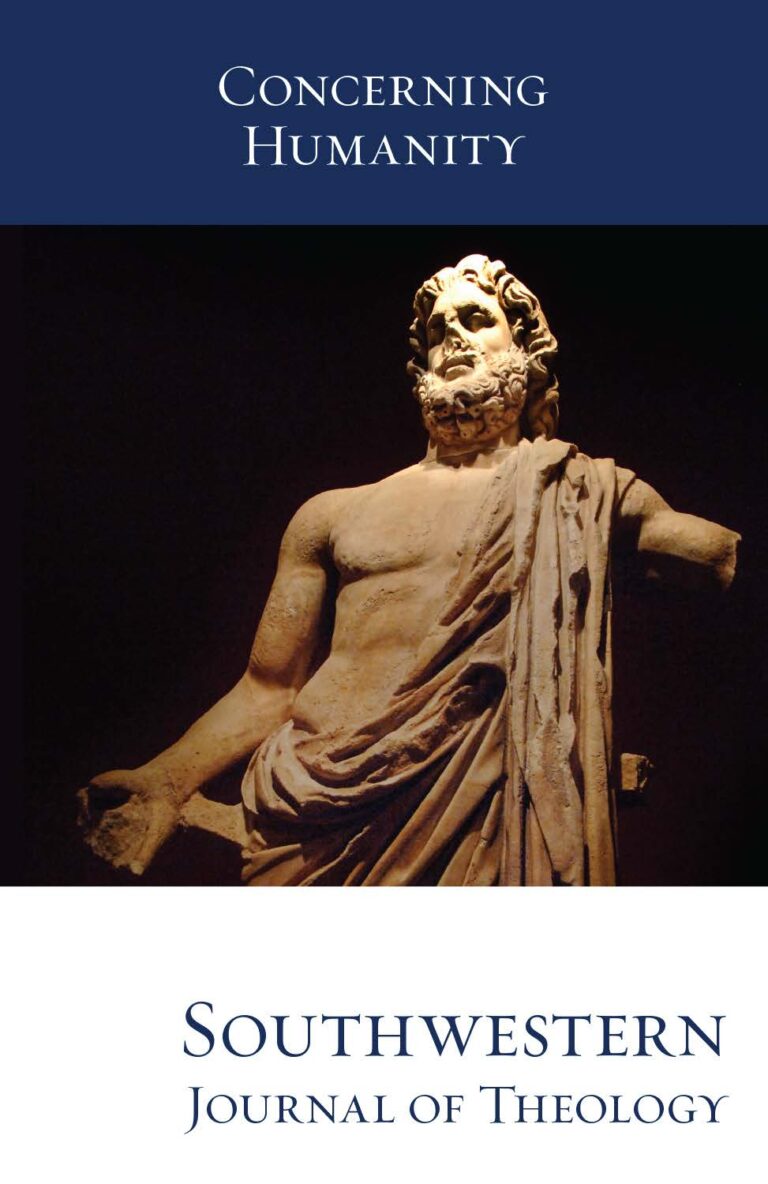
Concerning Humanity
Southwestern Journal of Theology
Volume 59, No. 1 – Fall 2016
Managing Editor: W. Madison Grace II
Calvin stated at the beginning of his Institutes that “nearly all the wisdom we possess, . . . consists of two parts: the knowledge of God and of ourselves.”1 This dual construction of wisdom points to the necessity of the study of ourselves—the study of anthropology—because the two are intimately connected. Though Calvin asserts that it is important to study humanity because it “is the noblest and most remarkable example of [God’s] justice, wisdom, and goodness . . . ” he argues the greater importance of considering anthropology is because “we cannot have a clear and complete knowledge of God unless it is accomplished by a corresponding knowledge of ourselves.”2 The study of God—theology—and the study of humankind— anthropology—are inextricably linked. How one understands one of these doctrines will effect the development of the other.
The study of humanity encompasses all of what a person is. How are we created? What makes up our person? What does it mean to male and female? It is important that we consider these, and many more questions, as we construct our own theologies. For if we do not give them the attention they deserve, or if we answer them incorrectly or inadequately, deficiencies will arise in our theologies as a whole.
For instance, a priority ceded to the immaterial (i.e. soul or spirit), part of the human person, over against the body, says something about the human person that has effects elsewhere in theology. The consequences of diminishing the body is perilous for a wholistic concept of the person. A misunderstanding of the theology of the body leads to misunderstandings in ethical issues such as sexuality, human reproduction, social relations, and the dignity in personhood to name a few.
In addressing anthropology, the German theologian Dietrich Bonhoeffer understood the necessity of affirming a proper relation between body and soul as it relates to the Creator in whose image humanity was created. He states, “The body is not the prison, the shell, the exterior, of a human being; instead a human being is a human body. A human being does not ‘have’ a body or ‘have’ a soul; instead a human being ‘is’ a body and a soul.”3 The essential nature of the person as body and soul is a direct reflection of the image of God in which humanity is created. Though the present state of a person exists in a state of sin, the formation of a person as body and soul remains God’s purpose and plan for humanity. We cannot merely slough off one or the other to fit our theological ends. Moreover, the importance of such a construction of the person is evidence by the doctrine of redemption itself. If the entrance of sin marred the make-up of the human person then redemption must address the present deficiencies in human personhood. Thus the Son was sent to earth to become not only a human but the new humanity in and through which redemption is accomplished.
As we can see, the doctrines of salvation and Christ both find connection and importance with and to the doctrine of humanity. Needless to say that Christian theology, and the Christian doing theology, should be concerned with anthropology—concerned with humanity. This issue of the Southwestern Journal of Theology is entitled “Concerning Humanity” and the articles that follow touch upon the various aspects of this important loci of theology.
The first article by Chad Meeks, “What Can Science Tell Us about the Soul?” addresses the anthropological conflict that exists between contemporary science, and especially materialists who see humans only as bodies, and a classic Christian position of dualism, which claims humans are composed of bodies and souls. In the article Meeks is less concerned with proving dualism over against materialism, rather he is asking if science is able to answer the question, Do humans have souls? In particular, scientific naturalism and its methods are explained and analyzed to show they are deficient in proving the existance of a human soul.
The next two articles address different issues in ethics relating to human personhood: sexuality and reproduction. Robert V. Rakestraw takes on the topic of “Gay Sex and Grace” and particularly addresses “What does Grace Have to Do with Homosexual Practices.” It is an honest engagement with the question of homosexual practices, the biblical witness of such practices, and the grace of God. Following this article Evan Lenow writes on the question of third-party gamates in assisted reproductive technology. He asks the provocative question, Is this reproductive practice adultery? Lenow explains the particular practice of assisted reproductive technology and compares it to a biblical and theological definition of marriage to see if it violates the covenant of marriage.
The final article, “You Talkin’ to Me?” finds its connection with anthro- pology as it considers the question of the ethnic people of Israel in relation to 1 Peter 2:4–10. In this article Jim R. Sibley questions the belief of some theologians who claim that the church has replaced Israel in God’s plan. He particularly engages the pericope of 1 Peter 2:4–10 as a place to discuss these disagreements.
The concerns of humanity are highlighted in this volume in a variety of ways from engaging science to addressing sex and reproduction to looking at God’s plan for an ethnic people. These are just some of the issues that concern humanity that Christians should consider as we engage the dual task of gaining a knowledge of God and a knowledge of humanity.
- John Calvin, Institutes of the Christian Religion, vol. 1, edited by John T. McNeill, translated by Ford Lewis Battles (Philadelphia: The Westminster Press, 2011), 1:35. ↩︎
- Ibid., 183. ↩︎
- Dietrich Bonhoeffer, Creation and Fall: A Theological Exposition of Genesis 1–3, vol. 3 of Deitrich Bonhoeffer Works, edited by John W. De Gruchy, translated by Douglas Stephen Bax (Minneapolis: Fortress, 2004), 77. ↩︎





